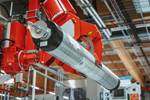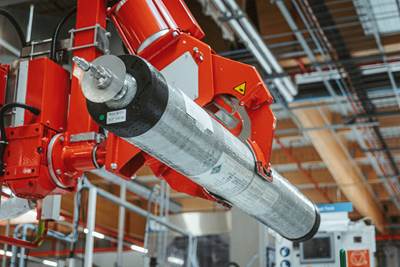Autocomposites market is expected to double revenue by 2032
Increase in demand for lightweight vehicles, stringent regulations and a rise in EV adoption are factors that are currently driving growth in automotive composites, according to a recent report.

Report insights. Source (All Images) | Allied Market Research
Allied Market Research (Wilmington, Del., U.S.), a full-service market research and business consulting wing of Allied Analytics LLP (Portland, Ore., U.S.) has published an analysis and forecast report for the 2023-2032 automotive composites market. According to the report, the market was valued at $7.4 billion in 2022, and is estimated to reach $16.4 billion by 2032, growing at a CAGR of 8.3% from 2023 to 2032.
The global automotive composites market is driven by rapid technological advancements. According to Allied Market Research, advances in composites manufacturing technologies — e.g., resin transfer molding (RTM) and automated fiber placement (AFP) — are making them more cost-effective and suitable for mass production. Furthermore, the rise of electric vehicles (EVs) is creating new opportunities for composites, to extend battery range and improve performance.
However, one of the primary restraints still impacting the automotive composite market is the high cost associated with composite materials as compared to traditional metals such as steel and aluminum; the manufacturing processes involved in producing composite materials, including molding, curing and finishing, tend to be more complex and capital-intensive; and, in addition, the cost of raw materials used in composites, such as carbon fibers and resins, remains relatively high. As a result, automakers face challenges in justifying the higher upfront investment required for integrating composites into vehicle structures.
Carbon fiber segment
By fiber type, the carbon fiber segment accounted for the largest share in 2022, contributing to more than two-thirds of the global automotive composites market revenue. Carbon fiber’s lightweight can improve fuel efficiency and overall performance of vehicles, especially in terms of acceleration, handling and braking. Furthermore, stricter emissions standards such as Bharat stage (BS-V and BS-VI) and fuel efficiency requirements are pushing automakers to explore lightweight materials like carbon fiber to reduce vehicle weight and meet regulatory standards; lighter vehicles generally produce fewer emissions and consume less fuel.
Thermosets segment
By resin type, the thermoset segment accounted for the largest share in 2022, contributing to more than half of the global automotive composites market revenue. Thermoset resins offer high strength, stiffness and dimensional stability, which are crucial for automotive applications. These resins provide durability and resistance to heat, chemicals and fatigue, making them suitable for various components in vehicles. Moreover, thermoset composites can be molded into complex shapes, enabling novel designs and integration of multiple functionalities into a single component. This flexibility enables automakers to optimize the design of automotive parts for performance, aesthetics and functionality.
Exterior segment
By application, the exterior segment accounted for the largest share in 2022, contributing to nearly half of the global automotive composites market revenue. Composites’ light weight make them particularly attractive for exterior components where reducing weight is crucial. Additionally, composites can be molded into complex shapes with ease, providing automakers with the to create distinctive exterior designs that not only enhance the vehicle’s aesthetics but also improve aerodynamics.
Asia-Pacific to maintain its dominance by 2032
By region, Asia-Pacific held the highest market share in terms of revenue in 2022, accounting for one-third of the global automotive composites market and is projected to register the highest CAGR of 9.0% during the forecast period. The Asia-Pacific region is a major hub for automotive manufacturing, with countries like China, Japan, South Korea and India leading the production.
Within the report, Allied Market Research also provides a detailed analysis of list of leading market players in the autocomposites space. These players have adopted different strategies such as new product launches, collaborations, expansion, joint ventures, agreements and others to increase their market share and maintain dominant shares in different regions:
- Toray Industries Inc.
- SGL Carbon SE
- Teijin Ltd.
- Hexcel Corp.
- Owens Corning
- Mitsubishi Chemical Holdings Corp.
- Gurit Holding AG
- Syensqo (previously Solvay S.A.)
- Toray Advanced Composites (previously TenCate Advanced Composites)
- Huntsman Corp.
It is noted that the report is valuable in highlighting business performance, operating segments, product portfolio and strategic moves of market players to showcase the competitive scenario.
Find the full report here.
Related Content
Plant tour: Joby Aviation, Marina, Calif., U.S.
As the advanced air mobility market begins to take shape, market leader Joby Aviation works to industrialize composites manufacturing for its first-generation, composites-intensive, all-electric air taxi.
Read MoreComposites end markets: Automotive (2024)
Recent trends in automotive composites include new materials and developments for battery electric vehicles, hydrogen fuel cell technologies, and recycled and bio-based materials.
Read More“Structured air” TPS safeguards composite structures
Powered by an 85% air/15% pure polyimide aerogel, Blueshift’s novel material system protects structures during transient thermal events from -200°C to beyond 2400°C for rockets, battery boxes and more.
Read MoreThermoplastic composites: Cracking the horizontal body panel nut
Versatile sandwich panel technology solves decades-long exterior automotive challenge.
Read MoreRead Next
Forvia moves toward more sustainable automotive composites manufacturing
Automotive technology supplier Forvia shares sustainability goals and recent developments aimed at bio-based and recycled materials and ramping up hydrogen tank production for clean mobility.
Read MoreSMC composites progress BinC solar electric vehicles
In an interview with one of Aptera’s co-founders, CW sheds light on the inspiration behind the crowd-funded solar electric vehicle, its body in carbon (BinC) and how composite materials are playing a role in its design.
Read MorePlant tour: Daher Shap’in TechCenter and composites production plant, Saint-Aignan-de-Grandlieu, France
Co-located R&D and production advance OOA thermosets, thermoplastics, welding, recycling and digital technologies for faster processing and certification of lighter, more sustainable composites.
Read More














.jpg;maxWidth=300;quality=90)









